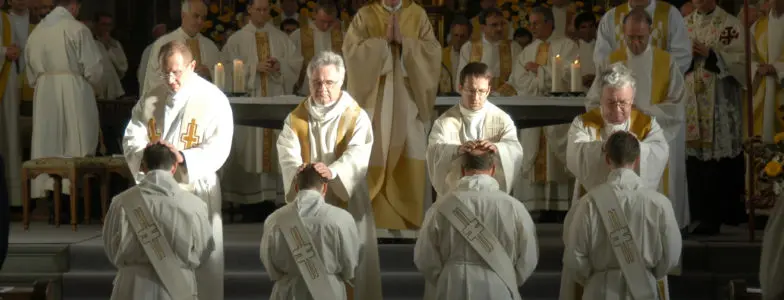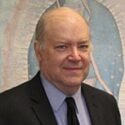Why Should Celibate Priests Speak about Abortion?
When the battle over abortion began in earnest nearly half a century ago, pro-abortion strategists correctly identified their number one enemy as the Roman Catholic Church. They were fully aware that, if a large number of priests began to speak forcefully and knowledgably against abortion, the Church would quickly become a mighty force for the protection of the unborn and would make a significant or even decisive difference in the fight.
After much discussion, the leaders of the pro-abortion movement adopted a highly effective strategy of sexual intimidation. They insisted that, since the Catholic hierarchy is composed of a male, celibate clergy, priests had no standing to speak about abortion. This is a refinement of the more general allegation that men can’t get pregnant, so they have no right to speak out against abortion ― hence the slogan “If men could get pregnant, abortion would be a sacrament.”
In 1968, NARAL co-founder Larry Lader said to Dr. Bernard Nathanson, “Historically, every revolution has to have its villain…. You know who I mean, Bernie…. the Catholic hierarchy. That’s a small enough group to come down on, and anonymous enough so that no names ever have to be mentioned.”1
Since the Church is a hierarchical structure, pro-abortionists have generated an endless barrage of propaganda designed to keep priests on the sideline of this fight. Unfortunately, too many priests welcome the opportunity to avoid speaking on the difficult topics of abortion and contraception.2
Christopher Durang is typical of those who seek to keep priests on the sidelines. He asks:
Would you trust a chef who never eats food? Or a car mechanic who never drives a car? Or a swimming coach who’s never been in the water? It’s an old liberal complaint, of course ― sexual morality being dictated by a celibate, male clergy. But old complaint or not, that sure is a loony place to look to for wisdom and guidance on sexuality…. I don’t have an interest in any way in anything the Vatican is likely to say.”3
The Real Motives Behind the Argument
This is perhaps the most glaring example of hypocrisy exhibited by pro-abortion groups attempting to undermine Church teachings on abortion. When the occasional dissenting priest speaks out for abortion, abortion advocates praise him as a hero.
For example, pro-abortionists applauded when notorious dissenter Fr. Robert Drinan said, “As a Catholic, Jesuit, and priest, I’m against it [abortion], except for women!”4 Catholics for a Free Choice also actively solicited dissenting priests (and celibate religious sisters) to sign its infamous 1984 New York Times statement “A Catholic Statement on Pluralism and Abortion.”5
This means that pro-abortionists do not really want celibate priests and religious sisters to remain silent on abortion ― as long as they are for it.
The dissenting group Catholics for a Free Choice has long been a leader in convincing priests and lay Catholics to remain uninvolved, and its propaganda is highly polished. When a celibate male Catholic priest agrees with CFFC on its views regarding sexual morality, the group’s writers laud him as being “thoughtful,” “carrying out the Catholic tradition of social justice,” and “rejoicing in the work of the Holy Spirit.”6 But when a Catholic priest disagrees with the group on any aspect of sexual morality, CFFC slanders him relentlessly.7
Who Can Speak about Abortion?
Many dissenters allege that only a person who can experience something may speak about it. This may sound reasonable until we see how inconsistently they implement this principle.
For example, CFFC writer Mary Baldwin said, “After Roe v. Wade in 1973, I attempted to understand how women considering an abortion felt. It was clear to me that men shouldn’t speak or advise on this subject. They have no direct life experiences to draw on, I reasoned.”8
However, CFFC and other pro-abortion ‘Catholics’ don’t follow their own rules; their writers and speakers criticize individual bishops and the priesthood, even though they themselves will never “have the experience” of being priests or bishops. For example, Rosemary Radford Ruether claims that the bishops are “not qualified to speak on the subject of women,” simply because they are not women themselves.9
Perhaps if she desired to be consistent, she would mirror this statement by acknowledging that pro-abortion women are “not qualified to speak on the subject of men,” and should halt their ceaseless criticism of the Catholic bishops, who of course are all men. It is also interesting to note that abortion advocates in general despise pro-life women (especially high-profile women like Sarah Palin and Lila Rose), and are even more spiteful about women who have had abortions and who have repented of them.
Women who have had abortions are certainly qualified to speak about its baleful effects, but are ignored or even viciously condemned by their pro-abortion “sisters.”
Under the Holy See’s June 1980 Pastoral Provision, about eighty married Catholic priests live and work in the United States today, the majority of whom were previously Episcopalian priests.10 Usually, they left their denominations because they desired the orthodoxy and constancy of the teachings of the Catholic Church. In addition, there are hundreds of Catholic priests who were ordained after their wives died.
The priests with such life experience generally are even more pro-life than priests who have never been married. This counters the pro-abortion argument that celibate priests do not know what they are talking about.
In addition to the occasional pro-abortion priest, there are plenty of lay Catholic men speaking out for abortion. These have included Teddy Kennedy, Mario Cuomo, Daniel Maguire, Joseph O’Rourke, Kevin Gordon, Andrew Merton, Bob Packwood, and countless others. None of them will ever get pregnant. None of them will ever face the possibility of abortion. Why do abortion advocates approve of them speaking out on the abortion issue? Why don’t feminists tell them to mind their own business?
The truth of an argument has nothing whatsoever to do with the speaker’s sex, age, race, religion, sexual preference, or any other personal variable. If a statement or argument of principle is true, then it is true ― it matters not who is saying it! Anyone who says that bishops or priests have no right to speak on sexual morality ― or that men in general have no right to oppose abortion ― is, by definition, a sexist.
Final Thoughts
Lay Catholics should pray for their priests and encourage them to speak out against the evils of abortion, contraception and sterilization. If enough priests begin to take action on these issues, it will make a significant difference in the abortion fight. More importantly, it will certainly spare many women (and men) the heartbreak suffered by so many millions already.
Endnotes
[1] National Association for the Repeal of Abortion Laws (NARAL) co-founder Larry Lader, speaking to Bernard M. Nathanson, M.D., as described in Nathanson’s book The Abortion Papers: Inside the Abortion Mentality [Madison, Wisconsin: Idea Books], 1985.
[2] This unfortunate fact was an unending source of frustration to the founder of Human Life International, Father Paul Marx, and he would speak about it frequently.
[3] Christopher Durang. “Natural Law and Disorder.” Conscience, Spring/Summer 1995, pages 7 and 8.
[4] Pro-abortion Congressman and priest Robert Drinan (D.-Ma.), quoted in “Drinan … One Exception.” National Right to Life News, August 1979, page 5.
[5] Several Catholic priests signed the October 7, 1984 New York Times statement entitled “A Catholic Statement on Pluralism and Abortion,” signed by 97 theologians and members of ‘Catholics’ for a Free Choice and other dissenting groups.
[6] Margaret Conway. “Public Funding: CFFC Makes Waves in Michigan Abortion Rights Battle.” Conscience, May/June 1988, pages 12 to 16; and Mary E. Hunt. “Limited Partners.” Conscience, May/June 1988, page 7.
[7] Past issues of CFFC’s journal Conscience have referred to faithful bishops as “absolutist,” “angry,” “anti-woman,” “arrogant,” “blind,” “bullies,” “callous,” “coercive,” “confused,” “cruel,” “dangerous,” “dogmatic,” “dumb,” “embarrassing,” “fanatical,” “hard-hearted,” “harsh,” “hypocritical,” “illogical,” “imperialistic,” “irresponsible,” “liars,” “loony,” “Luddites,” “manipulative,” “mean,” “misogynist,” “nasty,” “narrow-minded,” “obsessive,” “obstructive,” “pathological,” “pernicious,” “pig-headed,” “prattlers,” “ranting,” “reactionaries,” “rigid,” “ruthless,” “sanctimonious,” “self-righteous,” “simplistic,” “slippery,” “terrible,” “totalitarian,” “tyrannical,” “unethical,” “unhinged,” “unjust,” “unkind,” “vehement,” “virulent,” and “vituperative,” and even “betrayers of Christ” and “the seed of Satan,” among many other labels.
[8] Marie Baldwin. “Ardently Prochoice.” Conscience, Winter 1997/1998, pages 15 and 16.
[9] Rosemary Radford Ruether. “The Catholic Bishops’ Pastoral on Women: A Flawed Effort.” Conscience, May/June 1988, pages 5 and 6.
[10] Mark Oppenheimer. “A Cohort of Married Roman Catholic Priests, and More Are on the Way.” New York Times, January 8, 2012. The Pastoral Provision states, “The Holy See has specified that this exception to the rule of celibacy is granted in favor of these individual persons, and should not be understood as implying any change in the Church’s conviction of the value of priestly celibacy, which will remain the rule for future candidates for the priesthood from this group.”
Did you find this useful?
Dr. Brian Clowes has been HLI’s director of research since 1995 and is one of the most accomplished and respected intellectuals in the international pro-life movement. Best known as author of the most exhaustive pro-life informational resource volume The Facts of Life, and for his Pro-Life Basic Training Course, Brian is the author of nine books and over 500 scholarly and popular articles, and has traveled to 70 countries on six continents as a pro-life speaker, educator and trainer.






